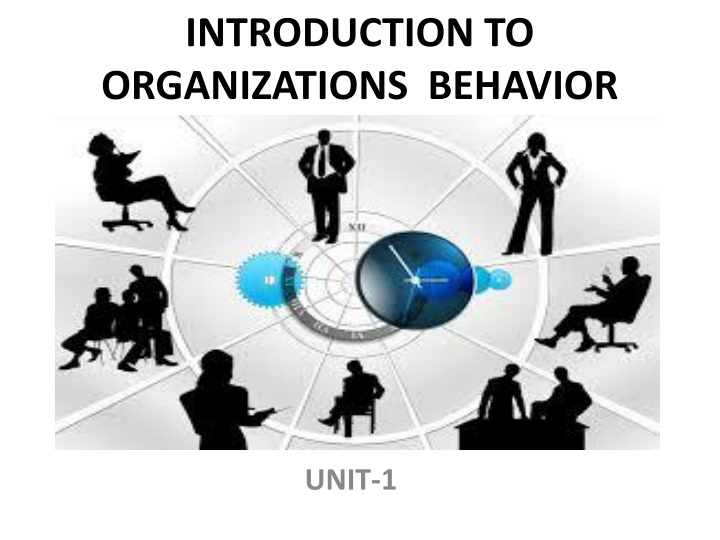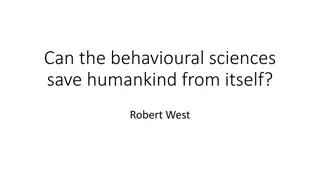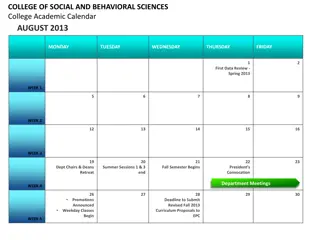Overview of Behavioral Sciences in Organizations
Explore the realms of psychology and social psychology within the context of organizational behavior. Psychology delves into the science of behavior and the mind, encompassing conscious and unconscious phenomena. Social psychology, on the other hand, focuses on understanding how individuals are influenced by the presence of others. Sociology broadens the perspective by studying societal patterns, social relationships, and cultural aspects of everyday life. These disciplines offer valuable insights for understanding human behavior within organizational settings.
Download Presentation

Please find below an Image/Link to download the presentation.
The content on the website is provided AS IS for your information and personal use only. It may not be sold, licensed, or shared on other websites without obtaining consent from the author.If you encounter any issues during the download, it is possible that the publisher has removed the file from their server.
You are allowed to download the files provided on this website for personal or commercial use, subject to the condition that they are used lawfully. All files are the property of their respective owners.
The content on the website is provided AS IS for your information and personal use only. It may not be sold, licensed, or shared on other websites without obtaining consent from the author.
E N D
Presentation Transcript
INTRODUCTION TO ORGANIZATIONS BEHAVIOR UNIT-1
Psychology Psychology is the science of behavior and mind. Psychology includes the study of conscious and unconscious phenomena, as well as feeling and thought. It is an academic discipline of immense scope.
Social psychology Social psychology is the scientific study of how people's thoughts, feelings, and behaviors are influenced by the actual, imagined or implied presence of others.
Sociology Sociology is a study of society, patterns of social relationships, social interaction and culture of everyday life. It is a social science that uses various methods of empirical investigation and critical analysis to develop a body of knowledge about social order, acceptance, and change or social evolution. Sociology is also defined as the general science of society.
Anthropology Anthropology is the scientific study of humans, human behavior and societies in the past and present. Social anthropology studies patterns of behavior and cultural anthropology studies cultural meaning, including norms and values. Linguistic anthropology studies how language influences social life
RELATIONSHIP BETWEEN OB & BUSINESS MANAGEMENT
Before we understand the relationships between OB & Business Mgt., Its important to understand what is management ..
What is Management? Management is the process of planning, organizing, leading, and controlling an organization s human, financial, material, and other resources to increase its effectiveness.
The Functions Of Management Management process of working with people and resources to accomplish organizational goals effective - achieve organizational goals efficient - achieve goals with minimum waste of resources 1-10
How these two are related ? Business management needs OB skills to take decisions . OB is a backbone of business management .
OB HELPS BUSINESS MANAGEMENT IN TAKING SEVERAL DECISIONS: By studying the principles of organizational behavior, managers become adept at the following five key skills: Identify and promote positive behaviors: "Prosocial" behaviors within an organization are those which benefit other individuals and the company as a whole. Leaders at every level of the organization need to be able to identify, promote and reward these behaviors -- and conversely, to discourage behaviors that lead to mistrust and other poor interpersonal dynamics between people who must work together. Create a positive workplace culture: Individual "prosocial" behaviors do not necessarily occur naturally. New hires do not come into organizations with a mental makeup optimized for the success of their companies. They must first be incentivized, in part through rewards, recognition, perks and bonuses. The right incentives are the building blocks of a supportive and selfless workplace culture.
OB HELPS BUSINESS MANAGEMENT IN TAKING SEVERAL DECISIONS: Motivate employees to exhibit "prosocial" behaviors: This discipline offers a set of motivational tools for managers to use, which takes into account individual differences between employees. Effectively, this skill is applied psychology and sociology for managers. Identify the causes of "antisocial" behaviors: Toxic behaviors that can infect a department and spread throughout an organization may originate with individuals; they may come from the top down; or they may even be the result of external or internal influences. A manager with expertise in organizational behavior will be able to find the root causes of negative behaviors and develop plans to solve the identified problems. Assess likely employee response before initiating organizational change: Predictive capabilities are among the most important for managers, and become even more important as leaders work their way up in the organizational structure. In order to determine the right strategies and implement them successfully, leaders at every level must be able to accurately anticipate how employees will react, and work to develop contingencies. The study of organizational behavior enables this predictive capability.
Role of Organizational Behavior in Management of Business 1. Globalization- Due to globalization, organizations are no longer confined to one particular country. The Manager s job is changing with the expansion of the organizations across the national borders. Example, Volkswagen builds its cars in Mexico, Mercedes and BMW in South Africa. Due to globalization, the management has to deal with the problems of unfamiliar languages, laws, work ethics, management styles etc. The functions of hiring, training, etc must acquire a global perspective. Organizational Behavior helps the management to become flexible, and proactive and enables it to execute the organization on a global scale. 2. Managing work Force Diversity- Organizations are a heterogeneous mix of people in terms of age, gender, race etc. Managing the workforce diversity has become a global concern. Managers have to deal with individuals and groups belonging to different ethnic cultures. They have to exercise control and channelize behavior in the desired direction. Organizational behavior help the managers to effectively deal with work force diversity by promoting its awareness, increasing diversity skills, encouraging culture and gender diversity.
Role of Organizational Behavior in Management of Business 3. Improving Quality and Productivity- Industries are facing the problem of excess supply. This has increased competition to a large extent. Almost every Manager is confronting the same problem of improving the productivity, quality of the goods and services their organization is providing. Programmers such as business process reengineering, and total Quality Management are being implemented to achieve these ends. Organizational Behavior helps the Managers to empower their employees, as they are the major forces for implementing this change. 4. Improving customer service-Most of the employees work in service sector. The jobs in the service sector, is very demanding. It requires continuous interaction with the organizations clients i.e. the customers. Management has to ensure that the employees do everything to satisfy the customers of the organization. The attitude and behavior of an employee affects the customer satisfaction. Organizational Behavior helps the managers to improve customer service and organizational performance.
Role of Organizational Behavior in Management of Business 5. Improving people skills- Organizational Behavior helps in better management of business as it helps in improving the skills of the people. It provides insight into the skills that the employees can use on the job such as designing jobs and creating effective teams. 6. Innovation and Change- Organizational Behavior helps in stimulating innovation and change. Employees can either be a hurdle or an instrument of change. It is organizational behavior which fosters ideas and techniques to promote innovation and change by improving employees creativity. 7. Work life balance- Organizations that do not help employees to achieve work life balance will not be able to retain their most talented employees. Organizational behavior helps I designing flexible jobs which can help employees deal with work life balance issues.
Role of Organizational Behavior in Management of Business 8. Promoting ethical Behavior- Sometimes the organizations are in a situation of ethical dilemma where they have to define right and wrong. It is Organizational Behavior which helps an important role by helping the management to create such a work environment which is ethically healthy and increases work productivity, job satisfaction and organizational citizenship behavior. 9. Creating a positive Work Environment.- Organizational behavior helps in creating a positive work environment in today s where competitive pressures are stronger than before. OB helps to develop resilience, human strength, and it fosters vitality.























